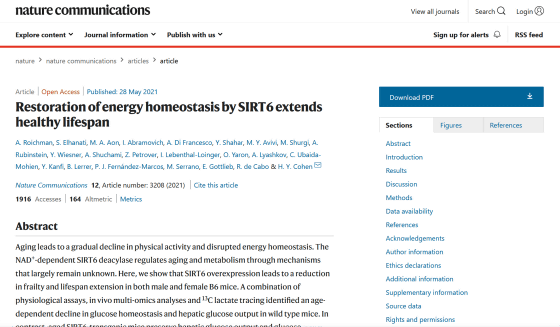Researchers succeed in extending mouse lifespan by 23% by increasing proteins that decrease with aging

Many people want to live as long as possible, and researchers around the world are investigating ways to extend their lives. A new
Restoration of energy homeostasis by SIRT6 extends healthy lifespan | Nature Communications
https://doi.org/10.1038/s41467-021-23545-7

Israeli scientists extend mice's lives by 23%, say method may work on humans | The Times of Israel
https://www.timesofisrael.com/israeli-scientists-extend-mices-lives-by-23-say-method-may-work-on-humans/
A research team led by Associate Professor Heim Cohen, who studies lifespan at Bar-Ilan University, has manipulated mouse genes to produce more proteins that decrease with age than normal mice. We conducted an experiment to investigate how the lifespan would change.
The subjects of this experiment are two types of proteins, SIRT1 and SIRT6 , which are known to decrease with age. The research team created 'normal mice,' 'mice that overexpress SIRT1,' 'mice that overexpress SIRT6,' and 'mice that overexpress SIRT1 and SIRT6,' and investigated the average life expectancy of each.
As a result of the experiment, it was found that the average lifespan in normal mice was 732 days for males and 756 days for females, but 932 days for males and 872 days for females that overexpressed SIRT6. It was found that the average life expectancy of SIRT6 increased by about 27% for males and about 15% for females. When males and females are combined, the average life expectancy has increased by 23%. Mice with both SIRT1 and SIRT6 increased had a similar lifespan, but mice with only SIRT1 increased had little lifespan.

The experiment also found that aged mice had a reduced ability to obtain energy from fat and lactic acid, while mice with high levels of SIRT6 maintained their ability to obtain energy from these nutrients. .. In addition, mice with high SIRT6 production had low cholesterol levels, were less likely to develop cancer, and were able to run faster.
'This finding shows that SIRT6 controls the rate of healthy aging, and that increasing SIRT6 activity can delay aging,' said Cohen. At the time of writing the article, it seems that there is no way to increase SIRT6 in the human body, but there is a possibility that 'drugs that increase SIRT6' can be developed in the next 2-3 years, and drugs will be used to prevent aging in the future. It may be said. “Changes in life expectancy are important because if humans have the same life expectancy as mice, they can live up to nearly 120 years on average,” Cohen said.

Related Posts:







